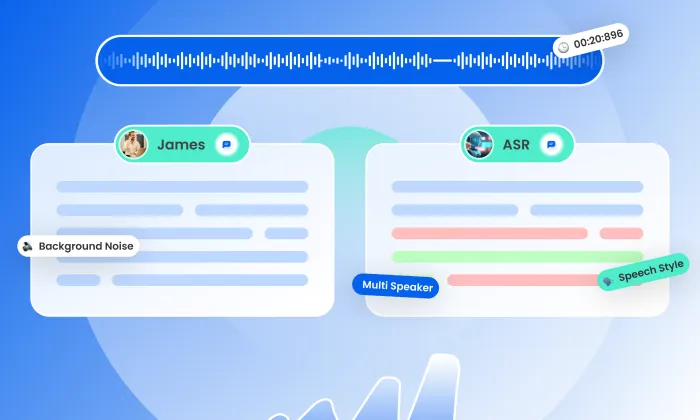How do I evaluate the quality of a TTS dataset?
TTS
Data Evaluation
Speech AI
Evaluating the quality of a Text-to-Speech (TTS) dataset is crucial for developing effective AI-driven voice technologies. A high-quality dataset directly impacts the performance of TTS models used in applications ranging from virtual assistants to customer service solutions. This guide offers insights into evaluating TTS datasets, emphasizing the practical implications of each evaluation criterion.
The Importance of TTS Dataset Quality
A TTS dataset comprises audio recordings paired with text transcriptions, categorized into scripted and unscripted types. Scripted datasets include structured text for specific contexts like storytelling, while unscripted datasets capture more natural, spontaneous speech. The quality of these datasets significantly influences TTS model performance, affecting the clarity and naturalness of synthesized speech.
Essential Criteria for Evaluating TTS Dataset Quality
Audio Quality and Its Impact
Audio quality is paramount when assessing a TTS dataset. High-quality audio enhances the intelligibility and realism of synthesized speech, leading to better user experiences:
- Sampling Rate and Bit Depth: A sample rate of 48kHz and a bit depth of 24-bit are industry standards, ensuring high audio fidelity and clarity. Poor quality audio can lead to higher user dissatisfaction rates, as the synthesized speech may sound unnatural or distorted.
- Signal Cleanliness: Recordings should be free from noise and artifacts like mouth clicks and pops. Clean audio prevents model errors and enhances user satisfaction.
- Spectral Quality: Ensuring the frequency content extends beyond 20,000 Hz helps maintain harmonic structure, which is crucial for rich timbre modeling.
Speaker Diversity for Relatable Experiences
Diverse speaker representation enriches a dataset, allowing models to adapt to various accents, genders, and age groups:
- Accent and Regional Variation: Including different accents improves the model's adaptability and relatability in diverse applications.
- Emotional Range: Datasets with varied emotional expressions enable models to generate contextually appropriate responses, enhancing user engagement.
Metadata and Annotation Accuracy
Accurate annotations are critical for effective model training:
- Text Transcripts: Precise text-to-audio alignment is essential. Misalignments can lead to suboptimal model outputs.
- Speaker Information: Metadata like speaker IDs, age groups, and gender details enable tailored model development, enhancing performance across demographics.
Ethical and Compliance Considerations
Ensuring datasets meet legal and ethical standards is vital:
- Consent Documentation: Obtain verifiable consent for all recordings, especially for sensitive demographics like children.
- Regulatory Compliance: Ensure datasets comply with regulations such as GDPR to uphold data privacy and ethical standards.
Navigating Dataset Evaluation Challenges
When evaluating TTS datasets, it’s important to balance several factors:
- Quality vs. Quantity: Prioritize high-quality audio over sheer volume. A smaller, well-curated dataset often outperforms a larger, lower-quality one.
- Customization Needs: Understand specific project requirements, such as desired accents or emotional tones, and assess potential customization options and costs.
Avoiding Common Pitfalls
Experienced teams can still encounter challenges when evaluating TTS datasets:
- Neglecting Audio Quality Checks: Relying solely on automated tools can miss artifacts. Manual reviews by audio engineers are recommended.
- Overlooking Speaker Diversity: A limited speaker pool can result in biased outputs and reduced applicability.
- Underestimating Metadata Value: Poorly annotated datasets can hinder training efficiency and model performance.
Enhancing TTS Model Performance with Quality Data
Evaluating a TTS dataset requires a comprehensive approach that considers audio quality, speaker diversity, accurate annotations, and compliance. By focusing on these factors, teams can ensure robust data for training adaptable TTS models, ultimately improving user experiences across applications.
Call to Action
For projects requiring high-quality TTS datasets that meet industry standards, FutureBeeAI offers expertly curated collections tailored to your specific needs, ensuring optimal model performance and user satisfaction. Contact us to explore how our solutions can support your AI initiatives. Additionally, you can learn more about our TTS Speech Dataset for comprehensive insights into our offerings.
Smart FAQs
Q.Why is it important to include diverse speakers in TTS datasets?
A. Diverse speakers ensure TTS models can accurately reproduce different accents and emotional tones, making them more adaptable and relatable across various user demographics.
Q. How does audio quality affect TTS model performance?
A. High-quality audio ensures that synthesized speech is clear and natural, preventing user dissatisfaction and enhancing the overall effectiveness of the voice technology.
What Else Do People Ask?
Related AI Articles
Browse Matching Datasets
Acquiring high-quality AI datasets has never been easier!!!
Get in touch with our AI data expert now!








